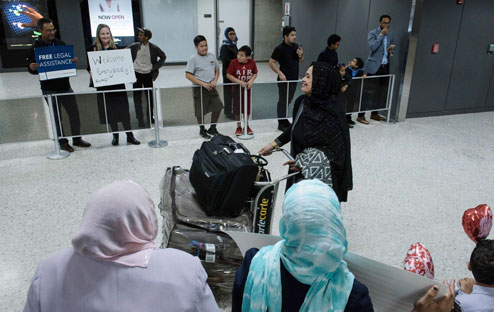Crossings

THE WHITE Immigration and Customs Enforcement (ICE) officer at Washington DC's Dulles airport was politely trying to ask a Muslim family if they were all going to California, and failing to convey his question. He called in a brown colleague for help. The brown ICE officer drew a circle in the air in front of the family, and asked the patriarch: "Togaather?"
The man - probably of Indian origin - beamed and nodded.
"Califournia ?" More smiles and nods, and they were through.

The day before, the Trump travel ban had been put on hold.
A little while later - after minimal questions in the shortest interview I've ever faced in the US - I saw the Muslim man and his son holding 'Welcome to USA' balloons as a man in a suit next to them addressed a press conference with a gaggle of photographers.
I admit I tried to photobomb from the background for about 10 seconds.
"Why are you taking pictures of my brother? He is from India, not Muslim," my sister, who had come to pick me up, hissed at a camera guy who mumbled an apology.
That was probably when it hit me how used we Indians are to surrendering our civil liberties. If random guards at malls were allowed to grope Americans as we are used to, there would probably be mass protests.

One of the key grouses against "Obamacare" is that everyone has to buy health insurance, including small businesses for employees. It's like the government forcing citizens, something much of America has a problem with, explained a US government health employee. "Demonetisation" flashed in front of my eyes.
The same health employee, on a recent visit to Arizona, was stopped and picked out from a car full of colleagues and asked if she was "born here".
She, an India-born naturalised US citizen, said: "I am a federal employee on official work."
No more questions asked.
A friend who works on environment studies worried about the future, another friend's wife petrified that her husband was documenting the airport protests with his camera.
"We often go hiking in 'red-neck country' and now I don't know whether we should," explained a friend who teaches at a Mary-land university.

Another friend said that Propublica - the non-profit journalism initiative headquartered opposite Wall Street in downtown Manhattan - and Washington Post had invoked the Freedom of Information Act (the US equivalent of our RTI) to ask for records about a US government seminar on climate change's impact on health that had been cancelled after President Trump happened. CNN - which Trump calls "fake news" - seemed to have found wider viewers, and every Trump setback was being celebrated like a Virat Kohli six. "Large swathes of white America are in deep trouble," said an Indian who is a US government employee. "But the life they are used to, doing small jobs, is not going to come back." He told me about his wife's white landlady in South Carolina, whose daughter sells her own blood for a living. On the train from DC to Baltimore, an elderly black man swiped out of the "Celebrity then and now" article he was reading to share on Facebook an article questioning Trump's sanity.
I could not but guffaw when my 11-year-old nephew reacted to my mother gushing about how fair he had become with: " Dida, that's racist. Like Trump!"
At a large Baltimore guitar shop, a guy walked in wearing a T-shirt depicting Trump bleeding from the head from a hammer hit. The shop guy, one of those gigging by night and store-fronting by day dudes, promptly asked him: "Hey man, can I take a picture of your T-shirt? My girlfriend's from a Spanish-speaking family and they'd love this."
As I finished noodling with an elderly black jazz guitarist - "I can bet my ass you in a band, man! No? You gotta be kidding me" - I wondered how many sedition cases our man would have been hammered with in India if he wore such an anti-national T.
Sumit Bhattacharya










